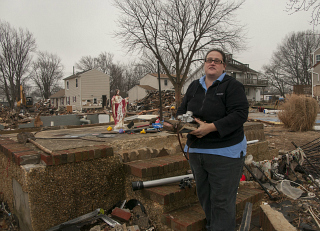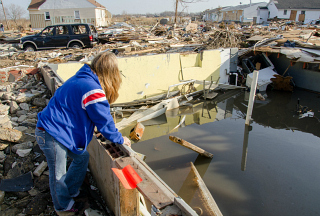Even as Congress passed the first part of an aid package for victims of Superstorm Sandy, many victims seethed, wondering why it took so long.
The $9.7 billion measure approved on Friday, Jan. 4, allows the National Flood Insurance Program to continue to pay claims. It was due to run out of money during the week of Jan. 7. But some of those still lugging waterlogged debris from homes or shoveling sand from lawns and walkways after the late October storm weren’t impressed.
“I think it’s horrible it took this long,” said Susan VanVeen, of Randolph, N.J., who was part of a volunteer group that drove to Lavallette to help clean up strangers’ homes. “This area is completely devastated. It’s still probably going to be weeks before people get this money. This should have happened a long time ago.”

John Condit, of Seaside Heights, N.J., which lost the boardwalk upon which much of the “Jersey Shore” reality series was filmed, also said the delay in approving aid after the storm was disgraceful.
“It’s just criminal,” he said. “We do all this work for other countries, but when it comes to us, it takes like 60 days. You pay taxes, and your government is supposed to be there for you. That’s part of the deal.”
Mike Furrey, part of the volunteer group in Lavallette, said he was angry about the delay in approving aid.
“They turned their backs on New Jersey and New York, but when Katrina happened, or things in other parts of the country, they act right away. I’m not going to vote for anyone who is in Congress right now, no matter what party, no matter if it’s the House or the Senate.”
Last Friday’s vote was the first of two anticipated votes, with a much larger appropriation of $51 billion coming up for consideration Jan. 15.

New Jersey Gov. Chris Christie, a Republican who blasted the leaders of his own party in the House when they failed to vote on an aid bill earlier last week, and New York Gov. Andrew Cuomo, a Democrat, issued a joint plea for Congress to pass both parts of the aid package.
“While we are pleased with this progress, today was just a down payment and it is now time to go even further and pass the final and more complete, clean disaster aid bill,” the governors said in their statement on Jan. 4.
“We are trusting Congress to act accordingly on January 15th and pass the final $51 billion instrumental for long-term rebuilding in order for New Jersey, New York and our people to recover after the severe devastation of Hurricane Sandy.”
Barbara Kirchoff, of Keansburg, N.J., said that her parents’ home was devastated by the storm, and that politicians in Washington don’t seem to care.
“My parents have nothing,” she said. “They need this money. A good portion of my town is a ghost town. They need help, now.”
Nigel Jawad, who works at the Amazing Deli in the Ocean Breeze section of New York City’s Staten Island, said most customers complain about a lack of financial assistance.
“Everybody keeps saying, `Where is the money?’ That’s all I hear from people,” he said. “People have no confidence in the government anymore.”
The storm scoured parts of New York, New Jersey and Connecticut and caused more than $60 billion in damage.
House Speaker John Boehner had delayed a vote on the aid package earlier last week but under pressure, scheduled a vote on the flood insurance portion to Jan. 4. Without the money, the flood program could have run out of money during the week of Jan. 7.
New York and New Jersey’s congressional delegation had said the states most affected by Sandy were being ignored.
Christie showed he was willing to aim barbs at the highest reaches of his party, saying the overall $60 billion bill could “could not overcome the toxic internal politics of the House majority.”
Some in the delegation reiterated their displeasure. Rep. Frank Pallone, Jr., a New Jersey Democrat, said Friday’s action is “too little, too late,” and only delays rebuilding.
Pallone noted that the flood insurance package doesn’t cover most of the money needed to rebuild. He said the votes should not be “piecemeal” and Congress should have acted on all parts on Jan. 4.
“You’re taking a small piece of this, and you’re doing it late,” Pallone told The Associated Press. “Why is it we have to continue to delay to deal with the major package?”
Rep. Chris Smith, a New Jersey Republican whose district was affected by the storm, said last Friday’s measure is “critically important” to help the state recover and rebuild.
“The devastation unleashed by Sandy is without precedent and the impacted communities are in dire need of comprehensive assistance,” Smith said in a statement. “Nowhere is this more evident than in the sheer magnitude of the housing damage and the subsequent housing need.”
Rep. Frank LoBiondo agreed the money is crucial.
“Today’s vote is a key step in getting critical federal assistance to the residents, businesses and communities devastated by Hurricane Sandy,” LoBiondo, a Republican, said in a statement on Jan. 4. “This week’s events make it clear that the need for help is real and that any additional delays in providing federal aid will be met with fierce resistance from myself, members of the delegation, and Governor Christie.”
Topics Flood New York New Jersey
Was this article valuable?
Here are more articles you may enjoy.


 The $10 Trillion Fight: Modeling a US-China War Over Taiwan
The $10 Trillion Fight: Modeling a US-China War Over Taiwan  Judge Awards Applied Systems Preliminary Injunction Against Comulate
Judge Awards Applied Systems Preliminary Injunction Against Comulate  Trump’s EPA Rollbacks Will Reverberate for ‘Decades’
Trump’s EPA Rollbacks Will Reverberate for ‘Decades’  Munich Re Unit to Cut 1,000 Positions as AI Takes Over Jobs
Munich Re Unit to Cut 1,000 Positions as AI Takes Over Jobs 

